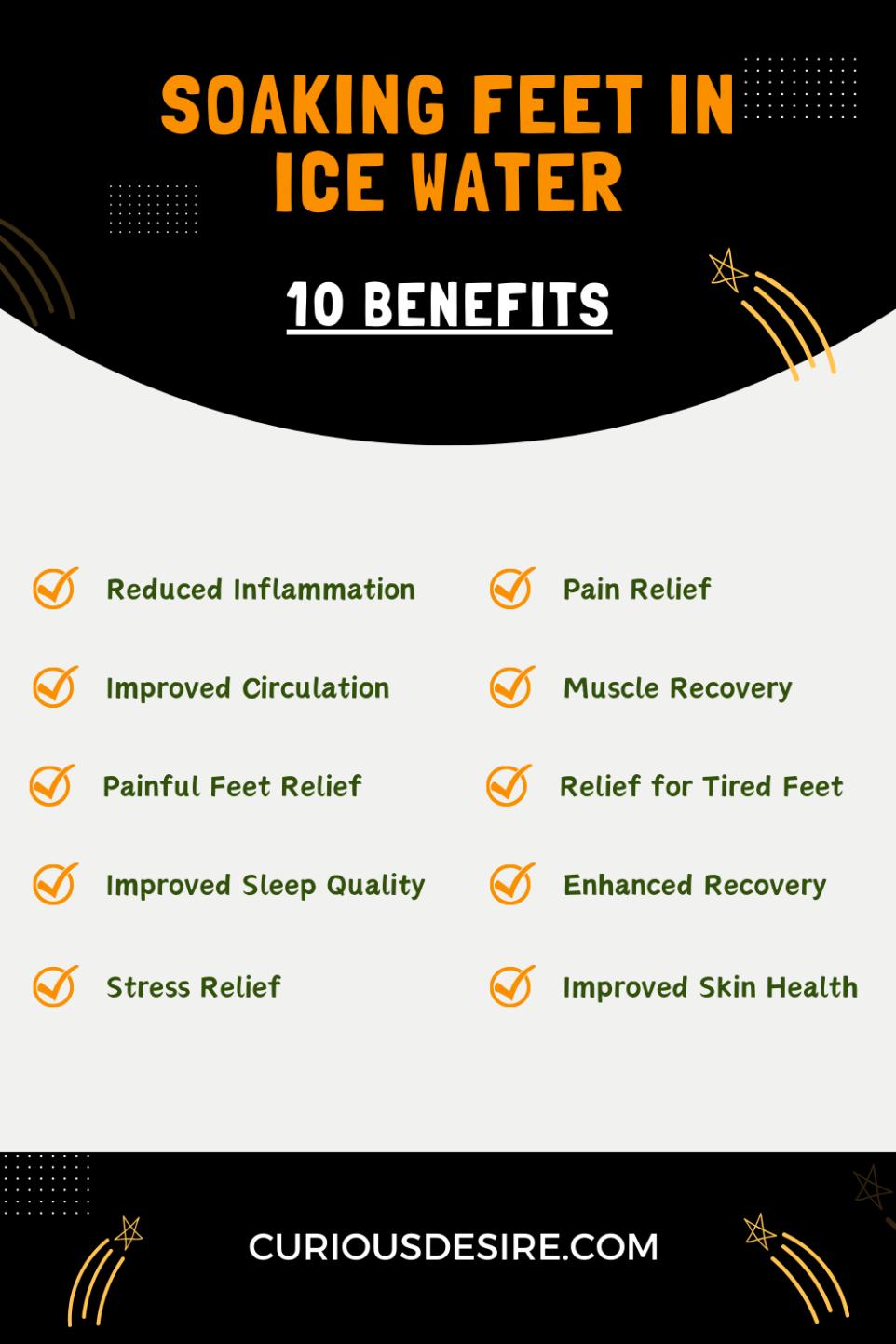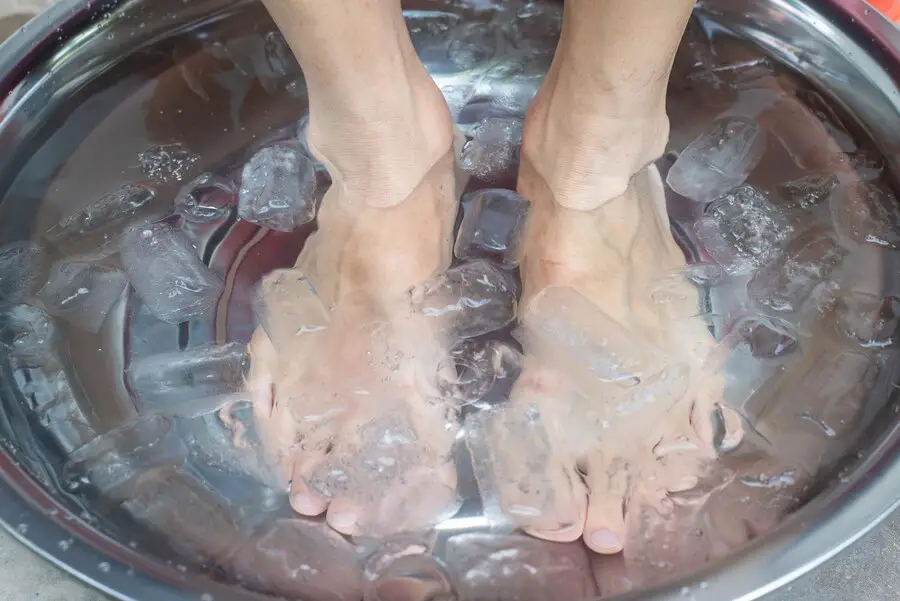Dipping your feet in ice water goes beyond a mere chill – it’s a quick and effective method with numerous benefits.
From soothing soreness to aiding recovery, this simple practice offers more than a refreshing dip.
In this article, we will explore the various benefits of soaking feet in ice water.
Here Are the 5 Most Common Benefits:
- Pain Relief
- Improved Circulation
- Improved Sleep Quality
- Improved Skin Health
- Muscle Recovery
[toc]

Benefit 1: Reduced Inflammation
Soaking your feet in ice water proves to be an effective method for reducing inflammation. As your feet soak in the cold water, blood vessels tighten, restricting blood flow to the area.
Everyday Health clarifies this process by explaining that when your body is submerged in cold water, blood vessels constrict, directing blood toward your organs where it gathers oxygen and nutrients.
Upon leaving the cold water, the blood vessels expand, delivering oxygen- and nutrient-rich blood to your tissues. This, in turn, can enhance circulation and alleviate inflammation.
This natural anti-inflammatory technique is particularly beneficial for individuals dealing with conditions like arthritis or injuries that result in inflammation.
Benefit 2: Pain Relief
The practice of immersing feet in ice water is well-known for its remarkable ability to alleviate pain, emerging as a popular remedy for soothing sore feet.
A study conducted by DiscoverMonk highlights the mechanism behind this effectiveness, revealing that cold-sensitive thermoreceptor cells in the skin of our feet become activated.
These cells send electrical impulses to the brain, exerting a pain-relieving effect.
This method proves particularly advantageous following strenuous physical activities, as it effectively reduces muscle pain and discomfort.
Benefit 3: Improved Circulation
Soaking feet in ice water can positively impact circulation. Initially, the cold causes blood vessels to constrict, restricting blood flow.
However, as the feet warm up after the cold exposure, blood vessels dilate, facilitating improved circulation.
This cyclical process helps stimulate the circulatory system, promoting the efficient delivery of oxygen and nutrients to the feet.
Enhanced circulation can contribute to overall foot health, reducing the risk of issues related to poor blood flow, such as cold extremities or numbness.
Benefit 4: Muscle Recovery
Cold water immersion for feet is widely used in sports medicine to speed up muscle recovery, particularly for injuries impacting foot bones.
The cold temperature helps reduce inflammation by constricting blood vessels, providing relief from muscle soreness, and expediting the repair process.
As highlighted in a blog post by Training and Conditioning, spending five or 10 minutes in cold, icy water has been recognized for its potential to enhance muscle recovery and improve future athletic performance.
Athletes commonly incorporate this practice into their recovery routines, promoting an overall acceleration of muscle recovery.
This allows them to quickly bounce back for subsequent training sessions or competitions.
The added comfort from the analgesic effect of cold water immersion makes it a valuable and accessible component of post-exercise regimens for athletes.
Benefit 5: Painful Feet Relief
Individuals grappling with conditions like plantar fasciitis can find relief through soaking their feet in ice water.
Plantar fasciitis according to Job Hopkins Medicins, is inflammation of the plantar fascia, tissue in the foot used during walking and foot movement.
Cold water immersion acts as a natural analgesic, numbing pain receptor and providing temporary relief from the discomfort associated with this condition.
It’s worth noting that while cold water immersion can provide relief, individuals with persistent or severe foot conditions should seek professional medical advice for a comprehensive treatment plan.
Benefit 6: Relief for Hot and Tired Feet
Soaking tired and overheated feet in cold water provides a refreshing sensation.
On hot days or after extended periods of standing, the cooling effect of cold water helps dissipate accumulated heat, providing relief and comfort.
The refreshing nature of the cold water also helps soothe any discomfort caused by fatigue.
This benefit is not only practical for individuals facing the challenges of a warm climate but is also applicable to those whose occupations involve prolonged periods of standing, such as healthcare professionals, teachers, or retail workers.

Benefit 7: Improved Sleep Quality
The positive impact of cold water immersion on sleep quality lies in its ability to induce relaxation in the nervous system.
This involves exposing the feet to cold water, triggering vasoconstriction, which reduces blood flow and, in turn, soothes the overall nervous system.
Referencing a study mentioned by The New York Times, a 20-minute soak in cold water was found to have a positive effect on sleep latency (the time it takes to fall asleep) and total sleep duration.
This reinforces the notion that the release of tension and stress through cold water immersion offers individuals an accessible and natural means to achieve a good night’s sleep.
Benefit 8: Enhanced Recovery from Injuries
Cold water immersion proves beneficial in the early stages of injury recovery by addressing two key aspects—reducing swelling and numbing pain.
In the aftermath of an injury, swelling is a common response due to increased blood flow to the affected area.
Cold water acts as a vasoconstrictor, minimizing blood flow and limiting the extent of swelling.
Simultaneously, the numbing effect helps manage pain, creating a more comfortable environment for the body’s natural healing processes to take place.
This dual action contributes to a faster recovery process and may assist in preventing secondary complications associated with excessive swelling and prolonged pain.
Benefit 9: Stress Relief
Immersing your feet in cold water not only feels refreshing but also plays a significant role in stress relief and overall well-being.
The shock of the cold water triggers a physiological response in the body, leading to the release of endorphins—natural mood enhancers that, as noted by Cleveland Clinic, help alleviate pain, reduce stress, and improve your overall sense of well-being.
Endorphins, often referred to as “feel-good” hormones, counteract the effects of stress and tension.
Also, the act of immersing your feet in cold water also serves as a form of mindfulness and self-care. The focused attention on the sensations of the cold water and the deliberate act of taking a moment for oneself contribute to a mental break from stressors.
Incorporating regular cold water immersion into a self-care routine can be a holistic approach to stress management, promoting both physical and mental well-being. It’s not just a treat for your feet; it’s a refreshing break for your mind.
Benefit 10: Improved Skin Health
Cold water’s benefits extend beyond muscle and joint health to positively impact the skin on the feet. The cold temperature helps tighten pores, reducing puffiness and promoting a healthier skin tone.
Additionally, the vasoconstrictive properties contribute to reduced swelling, enhancing blood circulation in the feet.
Improved circulation is vital for skin health, as it ensures the delivery of oxygen and nutrients while aiding in the removal of waste products.
For individuals dealing with issues such as dryness or discoloration, incorporating cold water immersion into their foot care routine may contribute to overall skin health and appearance.
Soaking Feet In Ice Water Benefits FAQs
What does soaking your feet in ice water do?
Soaking your feet in ice water reduces inflammation, numbs pain, and promotes faster recovery after strenuous activities.
The cold temperature provides relief from soreness and improves overall foot health.
Is it okay to ice bath feet?
Yes, it is generally okay to ice bath your feet. It helps reduce inflammation, soothes sore muscles, and promotes recovery. However, be mindful of the duration and consult a healthcare professional if you have concerns.
Is ice or hot water better for feet?
Both are beneficial. Ice reduces inflammation and numbs pain, while hot water relaxes muscles, improves circulation, and eases tension. Choose based on your specific needs.
Is ice water good for tired feet?
Yes, ice water is effective for relieving tired feet. It reduces swelling, provides a refreshing sensation, and improves circulation, promoting overall foot comfort.
Is it good to ice your feet every day?
Occasional ice baths are beneficial, but daily use may not be necessary for everyone.
Listen to your body, and consult a healthcare professional for personalized guidance.
Does ice help aching feet?
Yes, ice helps alleviate aching feet by reducing inflammation, numbing pain, and providing relief from discomfort, especially after prolonged standing or intense physical activity.